
The United States Navy Sea, Air, and Land (SEAL) Teams, commonly known as Navy SEALs, are the United States Navy's primary special operations force and a component of the United States Naval Special Warfare Command. Among the SEALs' main functions are conducting small-unit special operation missions in maritime, jungle, urban, arctic, mountainous, and desert environments. SEALs are typically ordered to capture or kill high-level targets, or to gather intelligence behind enemy lines. SEAL team personnel are hand-selected, highly trained, and possess a high degree of proficiency in unconventional warfare (UW), direct action (DA), and special reconnaissance (SR), among other tasks like sabotage, demolition, intelligence gathering, and hydrographic reconnaissance, training, and advising friendly militaries or other forces. All active SEALs are members of the U.S. Navy.

The Special Boat Service (SBS) is the special forces unit of the United Kingdom's Royal Navy. The SBS can trace its origins back to the Second World War when the Army Special Boat Section was formed in 1940. After the Second World War, the Royal Navy formed special forces with several name changes—Special Boat Company was adopted in 1951 and re-designated as the Special Boat Squadron in 1974—until on 28 July 1987 when the unit was renamed as the Special Boat Service after assuming responsibility for maritime counter-terrorism. Most of the operations conducted by the SBS are highly classified, and are rarely commented on by the British government or the Ministry of Defence, owing to their sensitive nature.

The Special Air Service Regiment, officially abbreviated SASR though commonly known as the SAS, is a special forces unit of the Australian Army. Formed in 1957 as a company, it was modelled on the British SAS with which it shares the motto, "Who Dares Wins". Expanded to a regiment in August 1964, it is based at Campbell Barracks, in Swanbourne, a suburb of Perth, Western Australia, and is a direct command unit of the Special Operations Command.

The 1st Special Forces Operational Detachment–Delta, also known as Delta Force, Combat Applications Group (CAG), or within Joint Special Operations Command (JSOC) as Task Force Green, is a special operations force of the United States Army under the operational control of JSOC. The unit's missions primarily involve counterterrorism, hostage rescue, direct action, and special reconnaissance, often against high-value targets.

The Special Reconnaissance Regiment (SRR) is a special reconnaissance unit of the British Army. It was established on 6 April 2005 and is part of the United Kingdom Special Forces (UKSF).
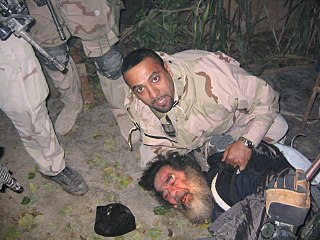
Task Force 121 was a United States Department of Defense special operations task force. TF121 was a multi-service force from Joint Special Operations Command, made up of operators from the U.S. Army's Delta Force, 75th Ranger Regiment, and 160th Special Operations Aviation Regiment, the U.S. Navy's SEAL Team Six, the CIA's Special Activities Division, U.S. Air Force Combat Controllers, Pararescuemen, Tactical Air Control Party operators, and Special Operations Weather Technicians, the Aviation Tactics Evaluation Group (AvTEG), and the Joint Communications Unit. Two companies of armor from the U.S. Army 4th Infantry Division and later two cavalry troops from 1/1 Cav 1st Armored Division provided armor support.
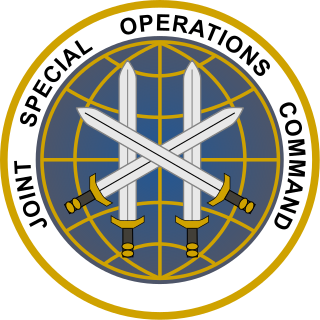
The Joint Special Operations Command (JSOC) is a joint component command of the United States Special Operations Command (USSOCOM) and is charged with studying special operations requirements and techniques to ensure interoperability and equipment standardization, to plan and conduct special operations exercises and training, to develop joint special operations tactics, and to execute special operations missions worldwide. It was established in 1980 on recommendation of Colonel Charlie Beckwith, in the aftermath of the failure of Operation Eagle Claw. It is headquartered at Pope Field.

The Special Forces Support Group (SFSG) is a special forces unit of the British Armed Forces. The SFSG was formed officially on 3 April 2006 to provide support to the Special Air Service, the Special Boat Service and the Special Reconnaissance Regiment on operations. It is a tri-service unit, composed of the 1st Battalion, Parachute Regiment,, a company of Royal Marine Commandos, and a flight (platoon) from the Royal Air Force Regiment.
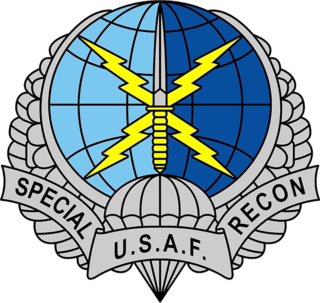
Special Reconnaissance (SR), formerly Special Operations Weather Technician or Team (SOWT), is conducted by trained Air Force personnel assigned to Special Tactics Squadrons of the United States Air Force Special Operations Command who operate deep behind enemy lines to conduct covert direction of air and missile attacks, place remotely monitored sensors, and support other special operation units. Like other special operations units, SR units may also carry out direct action (DA) and unconventional warfare (UW), including guerrilla operations. As SOWTs they were tactical observer/forecasters with ground combat capabilities and fell under the Air Force Special Tactics within the Air Force Special Operations Command (AFSOC). The mission of a Special Operations Weather Technician was to deploy by the most feasible means available into combat and non-permissive environments to collect and interpret meteorological data and provide air and ground forces commanders with timely, accurate intelligence. They collect data, assist mission planning, generate accurate and mission-tailored target and route forecasts in support of global special operations, conduct special weather reconnaissance and train foreign national forces. SOWTs provided vital intelligence and deployed with joint air and ground forces in support of direct action, counter-terrorism, foreign internal defense, humanitarian assistance, special reconnaissance, austere airfield, and combat search and rescue.
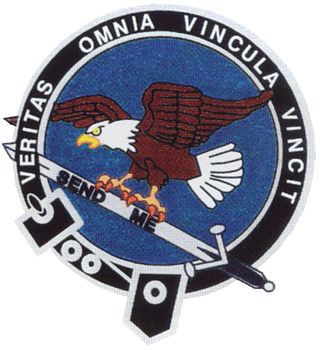
The Intelligence Support Activity (ISA), also known at various times as Mission Support Activity (MSA), Office of Military Support (OMS), Field Operations Group (FOG), Studies and Analysis Activity (SAA), Tactical Concept Activity, Tactical Support Team, Tactical Coordination Detachment, and also nicknamed "The Activity" and the "Army of Northern Virginia", is a United States Army Special Operations unit which serves as the intelligence gathering component of Joint Special Operations Command (JSOC). Within JSOC, the unit is often referred to as Task Force Orange.
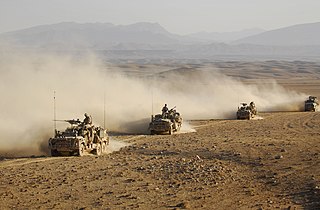
The special forces of the Australian Defence Force are units of Special Operations Command and associated units of the Royal Australian Navy and the Royal Australian Air Force that conduct and or support special operations to advance and protect the national security of the Commonwealth of Australia. The special forces of Australia have a lineage to a variety of units raised in the Second World War such as the Independent and Commando Companies, Z Special Unit, Navy Beach Commandos, and the Coastwatchers. Australian special forces have most recently been deployed to Iraq in Operation Okra as the Special Operations Task Group, as the Special Operations Task Group in Afghanistan, in Afghanistan in support of the Australian Secret Intelligence Service and regularly for counter-terrorism pre-deploy to locations of major domestic events throughout Australia in readiness to support law enforcement such as the 2014 G20 Brisbane summit.
The 323rd Parachute Ranger Squadron or Fallskärmsjägarna is a Swedish military special operations capable airborne ranger unit specialising in long-range reconnaissance.
A special mission unit (SMU), at one time referred to as a "tier 1" unit, is a designation for the United States military's most highly secretive and elite special operations forces. The term special missions unit is also used in Australia to describe the Special Air Service Regiment. Special mission units have been involved in high-profile military operations, such as the killing of Osama bin Laden and the attempted hostage rescue of Kayla Mueller.

The Joint Special Operations Command Task Force which fought in the Iraq War was a joint U.S. and British special operations temporary grouping assembled from different units. It has been described as a "hunter-killer team" with its core made up of the United States Army's 1st Special Forces Operational Detachment-Delta and the 75th Ranger Regiment, as well as the United States Naval Special Warfare Development Group and members of the United States Air Force's 24th Special Tactics Squadron, all under Joint Special Operations Command (JSOC) and elements from the United Kingdom Special Forces, including the Special Air Service, Special Boat Service (SBS), Special Reconnaissance Regiment (SRR), 18 (UKSF) Signal Regiment and the Special Forces Support Group (SFSG). The task force was reported to be responsible for the cross border raid into Syria from Iraq in October 2008 that resulted in eight deaths including Abu Ghadiya, along with several US operations in the Horn of Africa targeting al-Qaeda.
Operation Marlborough was the code name of a mission carried out by M Squadron Special Boat Service. The mission involved an SBS team from Task Force Black, in Baghdad, Iraq, on 23 July 2005 with support from the Special Air Service and U.S. military assets.

The Naval Special Warfare Development Group (NSWDG), abbreviated as DEVGRU and unofficially known as SEAL Team Six, is the United States Navy component of the Joint Special Operations Command (JSOC). The unit is often referred to within JSOC as Task Force Blue. DEVGRU is administratively supported by Naval Special Warfare Command and operationally commanded by JSOC. Most information concerning DEVGRU is designated as classified, and details of its activities are not usually commented on by either the United States Department of Defense or the White House. Despite the official name changes and increase in size, "SEAL Team Six" remains the unit's widely recognized moniker.

The Korps Commandotroepen (KCT) is the elite special forces unit of the Royal Netherlands Army. The KCT traces its origins to the Second World War with the founding of No. 2 (Dutch) Troop, and the founding of the Korps Speciale Troepen during the Indonesian War of Independence. At present, the unit is tasked with conducting the full spectrum of special operations, its principal tasks being direct action, special reconnaissance, military assistance and counter-terrorism.

The 525th Expeditionary Military Intelligence Brigade (Expeditionary) is a unit of the United States Army specializing in the acquisition and analysis of information with potential military value. On 28 October 2014, the unit was reflagged from the "525th Battlefield Surveillance Brigade" to an expeditionary military intelligence brigade, the first of its kind.
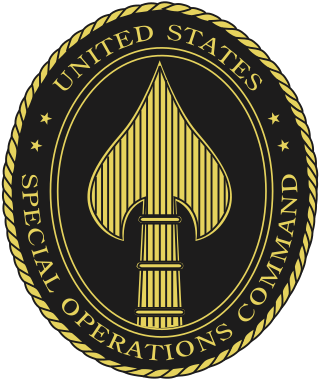
The United States Special Operations Command is the unified combatant command charged with overseeing the various special operations component commands of the Army, Marine Corps, Navy, and Air Force of the United States Armed Forces. The command is part of the Department of Defense and is the only unified combatant command created by an Act of Congress. USSOCOM is headquartered at MacDill Air Force Base in Tampa, Florida.















